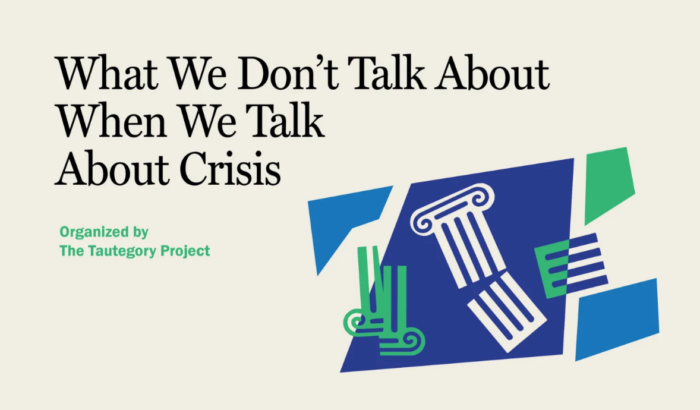
What We Don’t Talk About When We Talk About Crisis
September 8th & 22nd, 2023 (Online)
In response to the recent wave of articles, essays, and books discussing the crisis in Literary Studies and the Humanities more broadly, The Tautegory Project has organized two roundtables to reflect on, challenge, and complicate our current crisis discourse. By facilitating an open-ended conversation between scholars at different stages of their careers working across a range of institutions, we hope to generate insights, questions, and avenues for intervention that might lead to practical agendas for modest innovation and reform in the future. A brief open discussion with audience members will follow each roundtable.
To participate or attend you will need to register for each event via the Zoom links below:
- Roundtable One: September 8th 2:00-4:00 PM (EST): Featuring Kristen Case, Dana Ringuette, Sam Hushagen, Aaron Hanlon and Amal Eqeiq. Register for the Zoom meeting Here.
- Roundtable Two: September 22nd 2:00-4:00 PM (EST): Featuring Jonathan Arac, Zachary Tavlin, Paul Jaussen, Anna Kornbluh, and Mark Long. Register for the Zoom meeting Here.
The Tautegory Project is a network of scholars, students, and teachers devoted to developing and sustaining spaces for intellectual collaboration and critical communication. The term ‘tautegory’ (coined by Samuel Taylor Coleridge) combines the ideas of tautology and category to account for the continuities and similarities between distinct concepts, ideas, and phenomena without suppressing or ignoring their differences.
One of our guiding assumptions is that responsible and responsive intellectual work in any given field owes much to its tautegorical relations with a wider ecosystem of criticism and scholarship. We take conversations rather than conference presentations or scholarly articles as the most needed and effective means for fostering genuine and sustainable innovations in a period of dramatic institutional and cultural transformation. We are therefore particularly interested in critical discussions and arguments that address and explore commonplace oppositions between truth and value, science and the humanities and arts, and other reductive assumptions that make it difficult to sufficiently account for the real complexities of our current intellectual circumstances.
If you are in search of opportunities for conversation, collaboration, and mutual learning not shaped by the imperatives to professionalize, specialize, and publish we hope you will join us.
